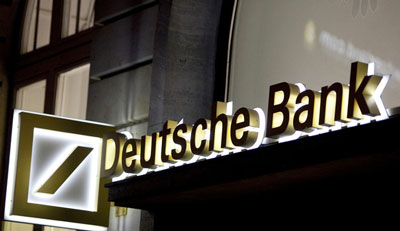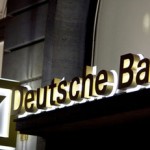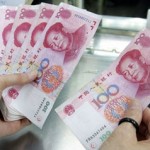Deutsche Bank to Face British Lawsuit Over High-Speed Trading

Deutsche Bank, already troubled by lawsuits and official investigations, faces another challenge. A group of lawyers said on Monday that they planned to sue the company in British court, accusing the bank of using high-speed trading software to profit in foreign currency markets at the expense of customers.
The lawsuit is to be filed later this year on behalf of companies, investors and even some central banks that frequently buy and sell currencies. The lawsuit would mirror one filed in New York last month by some of the same law firms. That lawsuit asserts that Deutsche Bank used a software platform known as Autobahn to take advantage of millisecond changes in exchange rates to give clients worse prices than they were entitled to.
Deutsche Bank denied the claims in the lawsuit, saying in a statement Monday: “We disagree with the allegations and will be defending ourselves in court.”
The lawsuit was filed last month against Deutsche Bank in Federal District Court for the Southern District of New York. The class-action lawsuit attracted little notice in the media until the German magazine Der Spiegel reported it on Sunday.
In November, the British bank Barclays agreed to a settlement with the New York State Department of Financial Services on claims very similar to the ones made against Deutsche Bank. Barclays agreed to pay $150 million and to fire an employee held responsible for the wrongdoing.
Christopher Rother, a Berlin lawyer involved in the lawsuit against Deutsche Bank, said on Monday that it was impossible to quantify the financial damage to the bank’s clients because the trading system was so opaque.
“I would say in the billions,” said Mr. Rother, who is head of the Berlin office of Hausfeld, a law firm with offices in Washington and other locations that filed the New York lawsuit in conjunction with several other firms.
Mr. Rother said that the complainants would ask the court to compel Deutsche Bank to turn over records that would shed light on the scale of the potential losses.
In recent years, Deutsche Bank has battled a long list of accusations of wrongdoing in financial markets. In November, the bank agreed with the authorities in the United States to pay a fine of $258 million in connection with allegations it conducted transactions with countries subject to American sanctions, including Iran, Libya, Syria, Myanmar and Sudan.
In April, Deutsche Bank agreed to $2.5 billion in penalties related to accusations it was among banks that manipulated global interest rates underpinning trillions of dollars in mortgages, student loans and other debt. The bank is also among those accused of colluding to rig benchmark rates for currencies, and it faces separate lawsuits from companies and other investors who say they lost money as a result.
Anshu Jain resigned as co-chief executive of Deutsche Bank in June amid complaints by investors that he had not done enough to infuse a greater sense of ethics in the London-based investment bank, which was at the center of most of the wrongdoing.
The latest accusations present another distraction for Mr. Jain’s successor, John Cryan, the former chief financial officer at the Swiss bank UBS, who is in the middle of a broad reorganization of Deutsche Bank designed to make it less complex and more profitable.
The currency lawsuits also illustrate the perils of high-speed trading and the potential for abuse by sophisticated market players.
Trades in the huge foreign currency market can be executed by computer platforms in milliseconds. The lawsuit claims that Deutsche Bank’s Autobahn platform delayed transactions sometimes by hundreds of milliseconds — an eternity in the world of currency trading.
If prices in that period moved in Deutsche Bank’s favor, it executed the trades, according to the New York lawsuit. If not, the bank refused the trades, the lawsuit claims. “Deutsche Bank exploited its superior bargaining position and superior knowledge” of the market, the lawsuit says.
The trading systems were devised to defend banks from attempts to exploit them in their role as intermediaries between currency buyers and sellers. Barclays had a currency trading system known as BARX that could delay trades slightly to detect and foil so-called toxic flows — attempts by hedge funds or others to game the system using their own sophisticated software.
But Barclays did not distinguish between toxic flows and normal trading, according to the settlement with the New York State Department of Financial Services, which detailed the circumstances of the case. Instead, Barclays used the trading delays to profit from ordinary clients, the settlement said.
When some clients complained that the software was causing them to miss opportunities to trade at better rates with other banks, Barclays senior managers instructed the bank’s traders and information technology specialists to give misleading answers, according to the settlement agreement.
Traders were told to “just blame it on the weekend IT release and say it’s being fixed,” the settlement agreement said.
The lead plaintiff in the class-action suit in New York is Axiom Investment Advisors, a small hedge fund. Mr. Rother said that his firm had been hired to represent several central banks that believed they had lost money because of the trading system. He would not name the central banks, but said they did not include the European Central Bank or the Bundesbank, the German central bank.
Hausfeld also represents clients in Africa, Asia and Europe who believe they were victims of currency-trading manipulation. Mr. Rother said the case against Deutsche Bank would be filed in London, the center of global currency trading, around the middle of the year.
Source: NYTimes – Deutsche Bank to Face British Lawsuit Over High-Speed Trading





























